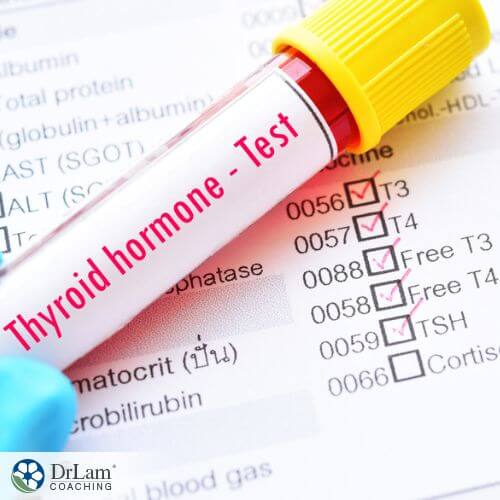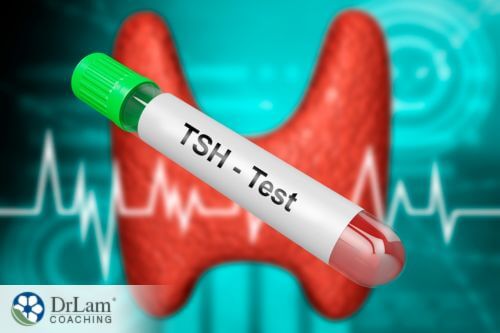Thyroid hormones are among the commonest hormones in the body, yet not many know their actual functions. Also, it is easy to get confused about the types and how they are controlled in the body. However, information about these hormones is crucial, considering the important role they play in day-to-day living. For this purpose, we will examine these hormones in more detail.
 These hormones are produced by the thyroid gland, a butterfly-shaped gland at the front of the neck, just below the “Adam’s apple.” After their production in the thyroid gland, thyroid hormones enter the bloodstream for subsequent distribution into body tissues. The thyroid gland and hormones are part of the body’s endocrine system.
These hormones are produced by the thyroid gland, a butterfly-shaped gland at the front of the neck, just below the “Adam’s apple.” After their production in the thyroid gland, thyroid hormones enter the bloodstream for subsequent distribution into body tissues. The thyroid gland and hormones are part of the body’s endocrine system.
To produce thyroid hormones, the thyroid gland uses iodine in the body, which is a nutrient present in many foods. Thyroid cells of the thyroid gland are the only cells in the body that can absorb iodine from the bloodstream. By combining the absorbed iodine with tyrosine, an amino acid, the thyroid gland can produce thyroid hormones.
The thyroid hormones are actually two primary hormones, namely thyroxine (T4) and triiodothyronine (T3). While the thyroid gland is also responsible for releasing calcitonin, a hormone that helps regulate calcium and phosphate in the blood, this hormone is not classified as a thyroid hormone. Here are the two hormones in more detail.
Also known as the T4 hormone, thyroxine is the main form of thyroid hormone the thyroid gland releases. About 80 percent of the thyroid hormones the thyroid gland produces are thyroxine. However, thyroxine is the less active thyroid hormone. Upon reaching the bloodstream, organs like the liver and kidney convert T4 into the active triiodothyronine (T3) hormone.
Also known as T3 hormones, triiodothyronine is about four times more active than thyroxine. However, only about 20 percent of the thyroid hormones the thyroid produces are T3. To meet up with the body’s T3 requirements, enzymes in the liver and kidneys convert T4 to T3 in a de-iodination process. Aside from these organs, the conversion of T4 to T3 can also occur at other sites in the body. These include the muscles, pituitary gland, adipose tissue, and the central nervous system (CNS).
Considering the significant difference in activity between T3 and T4, the former is commonly referred to as the active form of thyroid hormones. Also, many of the functions of the thyroid gland are ascribed to triiodothyronine.
Commonly called RT3, reverse T3 is a metabolite of thyroxine (T4), just like triiodothyronine (T3). Reverse T3 also contains the same number of iodine molecules as triiodothyronine. However, unlike triiodothyronine, reverse T3 is an inactive metabolite. This means that while reverse T3 can bind to a cell in the same way as triiodothyronine, RT3 cannot elicit any metabolic activity.
Although there have not been definitive answers to why the body produces RT3, scientists believe its production is a mechanism employed to preserve energy in serious health conditions. For instance, animal studies show an increase in circulating RT3 after stroke. Considering the unpredictable nature of RT3, conventional clinicians do not rely on it to identify thyroid conditions. However, functional providers might look at an elevated RT3 as an indicator of adrenals slowing down and therefore causing the thyroid also to put on the brakes.
The thyroid hormones are important for a variety of reasons in the body. Below are some of their functions:
 Regulating metabolism. This is the primary role of the thyroid hormones and is measured in terms of metabolic rate, which is the number of calories the body uses over a specific period. Regulation of the metabolic rate is essential in weight gain and loss in the body. The thyroid hormones also control the growth and development of the body.
Regulating metabolism. This is the primary role of the thyroid hormones and is measured in terms of metabolic rate, which is the number of calories the body uses over a specific period. Regulation of the metabolic rate is essential in weight gain and loss in the body. The thyroid hormones also control the growth and development of the body.The control of these hormones is essential for having the right amount in the body at any given time. This means that the production and release of T3 and T4 have to be well-regulated. In the body, the production and release of these hormones are controlled by a feedback loop system. This system involves the thyroid gland, pituitary gland, and hypothalamus.
Also, there are two primary hormones that are responsible for the control of the production and release of thyroid hormones - TSH and TRH. They function as follows:
The production and release of the thyroid-stimulating hormone (TSH) is under the control of the pituitary gland. This is a small, pea-sized gland at the base of the brain that is critical in several endocrine functions in the body.
TSH stimulates the production of thyroid hormones and informs the thyroid of how much thyroid hormone the body needs. About 80 percent of the hormones the thyroid produces after stimulation by the TSH are thyroxine (T4). The remaining 20 percent is triiodothyronine (T3).
While TSH is the hormone that actually binds to receptors in the thyroid gland to stimulate the production of thyroid hormones, it is controlled by another hormone produced in the brain – thyrotropin-releasing hormone (TRH).
In many thyroid hormones diagnostic tests, scientists usually measure the amount of TSH in the bloodstream. From the levels of TSH in the blood, it is possible to determine how much thyroid is in the body. For instance, if test reports show that levels of thyroid-stimulating hormone are low, it indicates an excess of T3 and T4 in the body. Conversely, when TSH is high, it indicates that there is a deficiency of thyroid hormones in the body.
This is a small hormone that the hypothalamus produces. The primary function of TRH is to stimulate the release of thyrotropin (and TSH) from the pituitary gland. Therefore, TRH is actually the origin of the feedback loop system responsible for the control of thyroid hormones.
When the brain detects a low amount of thyroid hormones, it sends a signal to the hypothalamus. The hypothalamus produces TRH, which stimulates the pituitary gland to produce TSH and thyroid hormones. Similarly, when the body notices an increase in T3 and T4, the brain signals the hypothalamus to stop the production of TRH.
The thyrotropin-releasing hormone is not easily measured in the bloodstream. Furthermore, there is much less chance of TSH being present at abnormal levels in the body. However, conditions that affect the hypothalamus can lead to reduced production of TRH. In turn, there is less production of TSH and thyroid hormones.
There are two major ways medical practitioners measure thyroid hormones – measurement of TSH and direct measurement of the thyroid hormones. Here is more information about these tests.
 Thyroid Stimulating Hormone (TSH) stimulates the production and release of thyroid hormones. Scientists can easily measure this hormone in the bloodstream, and it indicates the level of T3 and T4 in the body. If TSH is higher than normal in the body, then it indicates that thyroid hormone levels may be low. Therefore, medical practitioners can use this test to gain an initial overview of the thyroid function of a person.
Thyroid Stimulating Hormone (TSH) stimulates the production and release of thyroid hormones. Scientists can easily measure this hormone in the bloodstream, and it indicates the level of T3 and T4 in the body. If TSH is higher than normal in the body, then it indicates that thyroid hormone levels may be low. Therefore, medical practitioners can use this test to gain an initial overview of the thyroid function of a person.
Moreover, the TSH may be the more useful test in some circumstances. For example, sometimes the thyroid hormone levels in the body may be around the normal range, yet the TSH is high. This may mean that the thyroid hormone levels are falling and may eventually fall outside the normal range. This principle also applies if the TSH levels are low, yet the thyroid hormone levels appear normal.
A T4 test is a measurement of thyroxine levels in the body. There are two forms of T4 tests – total T4 test and free T4 test. For the total T4 test, both bound and free thyroxine hormones in the bloodstream are measured. Conversely, the free T4 test only measures the levels of T4 hormones that can freely enter body cells.
A T3 test is a measurement of the triiodothyronine levels in the body. As with the T4 test, there are two types of T3 tests, namely total and free T3 tests. These tests also measure the amount of bound and free triiodothyronine hormone in the blood. While this test is useful in detecting hyperthyroidism and its severity, it is not as reliable as the T4 test. Therefore, T3 tests are not commonly used in practice.
Thyroid hormones, like other hormones in the body, need to be present in just the right amounts. If there is an excess or deficiency of these hormones, different health conditions may arise. When assessing the thyroid hormone levels in the body, health practitioners usually compare blood test results with normal levels. Keep in mind though that normal values does not necessarily mean optimal values. The labs have certain normal ranges based on the number of specimens they have collected and have producde a bell curve of normal values based on their population. That's why different labs have different ranges for normal. In functional medicine, we look at optimal ranges rather than just what's normal. Here are some normal and optimal values of thyroid labs.
While interpreting test results, health practitioners often consider other factors that can influence thyroid hormone levels. These factors include thyroid cancer, previous pituitary gland conditions, pregnancy, age, sex hormones, other health conditions, and protein levels.
If the thyroid hormone levels in the body are abnormal, it is only a matter of time before different health conditions start to arise. Depending on whether they are too high or too low, the following conditions may result.
 Thyrotoxicosis occurs when there is an excess of thyroid hormones in the body. This usually results from an overactive thyroid gland (hyperthyroidism), which may be due to Graves’s disease. Aside from over-activity of the thyroid, inflammation or a tumor may also cause excess T3 and T4 in the body.
Thyrotoxicosis occurs when there is an excess of thyroid hormones in the body. This usually results from an overactive thyroid gland (hyperthyroidism), which may be due to Graves’s disease. Aside from over-activity of the thyroid, inflammation or a tumor may also cause excess T3 and T4 in the body.
The most typical symptom of thyrotoxicosis is goiter, which presents as an enlarged thyroid gland. Aside from goiter, the individual may also have weight loss, increased appetite, insomnia, fatigue, irritability, tremor, and an irregular menstrual cycle.
On the other hand, hypothyroidism is when there is too little thyroid hormones in the body. This may be due to an injury to the pituitary gland, hypothalamus, or thyroid gland. Autoimmune conditions, like Hashimoto’s, and poor iodine intake can also lead to low T3 and T4 levels.
Low thyroid hormone levels may also be due to a condition known as Adrenal Fatigue Syndrome (AFS). This occurs when the body cannot keep up with life’s chronic stressors. Normally, the body does an excellent job of managing stress. This is largely due to the efforts of its in-built stress-coping mechanism – the NeuroEndoMetabolic (NEM) Stress Response.
The NEM system consists of six circuits, which span several organs and systems in the body. The hormone circuit of the NEM is concerned with various hormones in the body. However, in the presence of chronic stress, this circuit may dysregulate. If this dysregulation remains for an extended period, AFS may result.
Low thyroid hormone levels can lead to unexplained weight gain, fatigue, dry skin, constipation, hair loss, and even mental health issues.
Considering the several health conditions and unpalatable symptoms that may accompany thyroid hormone levels imbalances, it is essential to understand how to balance thyroid hormones. Helpful strategies include:
Supplements can help naturally improve the function of thyroid hormones. Also, certain supplements may be useful in managing conditions that may affect thyroid function. However, it is important to consult your healthcare provider before using supplements.
Below, we consider some of the best supplements for thyroid function. If you're interested in one supplement that can support the thyroid optimally, we suggest Dr. Lam's Thyro-Blast, to help optimize thyroid function whether you are taking thyroid medication or not.
The body requires a sufficient amount of iodine to make thyroid hormones. Important sources of iodine include fish, dairy products (milk, yogurt, cheese, and eggs), and kelp. While the role of iodine in improving thyroid function cannot be overlooked, many medical practitioners are wary of recommending iodine because excess iodine can actually cause hypothyroidism.
This mineral is important for the synthesis of thyroid hormones. Selenium also helps maintain efficient thyroid metabolism and protects the thyroid from oxidative stress. Foods rich in selenium include Brazil nuts, seafood (tuna, salmon, sardines, and shrimp), cereals, and dairy products.
 A deficiency of several B vitamins in the body is often associated with thyroid conditions. This is because of the diverse roles of the B vitamins in regulating thyroid hormone function. While vitamin B complex supplements are good, people with conditions like Graves’ disease and Hashimoto’s will benefit more from vitamin B12.
A deficiency of several B vitamins in the body is often associated with thyroid conditions. This is because of the diverse roles of the B vitamins in regulating thyroid hormone function. While vitamin B complex supplements are good, people with conditions like Graves’ disease and Hashimoto’s will benefit more from vitamin B12.
Common sources of B complex vitamins include broccoli, leafy green vegetables (cabbage, kale, and spinach), peas, kidney beans, seafood, dairy products, and fortified foods, like breakfast cereal fortified with folic acid.
Studies show that vitamin D deficiency can negatively impact thyroid function. Research has also found that vitamin D supplements can improve TSH levels in the body. Good sources of vitamin D include oily fish (salmon, sardines, and herring), red meat, liver, orange juice, and fortified foods.
This mineral is vital in the production of thyroid hormones. Specifically, zinc can help improve triiodothyronine levels in the body. Excellent sources of zinc include oysters, red meat, poultry, beans, nuts, crab, whole grains, and dairy products.
Inositol is a type of sugar found in body tissues that help in the mediation of cell signal transduction to hormones, neurotransmitters, and growth factors. As a supplement, inositol is commonly associated with improving insulin function for people with diabetes. However, studies reveal inositol to be a useful supplement for improving thyroid function. Inositol naturally occurs in foods like fruits, beans, grains, and nuts.
Thyroid hormones are essential hormones for metabolism. They also have other useful roles in the body. There are two main types of thyroid hormones – thyroxine, or T4, and triiodothyronine, or T3. While both of these hormones are key to healthy living, they are prone to imbalances. Although the body does well in controlling them, certain conditions can cause an excess or deficiency of these hormones. When this happens, several health conditions may arise. However, there are some steps you can take to support the healthy production of these hormones.
For more information about thyroid hormones, Dr. Lam's Adrenal Fatigue Recovery Program can help you learn about the different stages of adrenal fatigue, the correct way to use supplements, beneficial exercises, and dietary recommendations. This comprehensive course also offers insights to help you sidestep the challenges Dr. Lam encountered during his own recovery journey. Dive deep into a holistic approach for adrenal health and well-being.
Thyrotropin-releasing hormone (TRH) is produced by the hypothalamus to stimulate the pituitary gland to produce thyrotropin (TSH). It is TSH that then stimulates the thyroid gland to produce thyroid hormones. Therefore, while TRH is important for starting the feedback loop that produces thyroid hormones, it doesn’t directly control them.